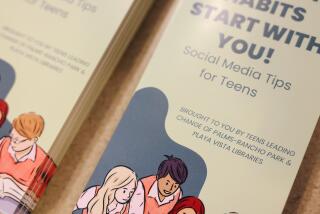Pouty-mouth poses for narcoleptic dudes
YOU COULD describe www.facebook.com as a digital yearbook, or the Internet equivalent of Greek T-shirts on frat brothers.
But most dead-tree yearbooks don’t have 3.6 million members or party construction systems. Real-world sororities don’t have names such as “Alpha Mega Pimpin,” “The Divine Innocence of Jessica Simpson” or “I Just Tried to Ford the River and My ... Oxen Died,” in homage to the 1980s video game “Oregon Trail.”
Facebook does. And it conquered college America instantly.
Like its paper predecessors, the site provides students with tools to stay in touch, proclaim school pride and scrawl in-jokes next to head shots. Pouty-mouth glamour puss is the favored female photo pose. Male portraits often capture narcoleptic undergrads mid-kegger, adorned with live animals, football-foam headgear -- or other narcoleptic undergrads.
But a glance at growth stats shows that as membership spreads -- faster than strep-throat bugs at a spin-the-bottle session -- the service is becoming a popular extension of real life at campuses across the country.
Many of the everyday social transactions in dorms or classrooms happen here too. Roommate linkups, study-group organizing, student government campaigns and -- oh yeah -- boozing and flirting.
“I had a killer time in your dorm room doing bong hits and chit-chatting on bananas!” one psych major comments on a buddy’s profile.
“I don’t know how to say this, but I kind of have a crush on you,” Judy writes on John’s page. “Check the ‘yes’ box if you like me back.”
“One time Berg was so drunk he passed out next to JC where he lived freshman year,” another undergrad recalls on a pal’s comment “wall.” “When the cop woke him up, he proceeded to talk ... and refer to Lambda Chi a few times.
“The cop said his blood alcohol level was 0.26. Wait, that wasn’t Berg, it was me.”
As in offline life, popularity and beauty seem linked, and the word “cheerleader” in a female profile is a dude magnet.
“One of the first things I noticed was that all the attractive people are friends,” said self-professed Facebook addict Daniel Shannon, 17, who will enter the University of Chicago in September.
But Facebook provides secret weapons for underdogs too. Tired of your name? Become “Flying Spaghetti Monster.” Bad hair day? Morph into Lindsay Lohan. Too shy to e-mail a secret crush? “Poke” them, an innocuous digital gesture used as a friendly wink or “wassup.”
Every interest, no matter how obscure, seems to have its own Facebook group, and these social cells transcend traditional clique castes of jock, geek, goth or prep.
It all began less than two years months ago, when programmer and Harvard undergrad Mark Zuckerberg responded to a Harvard Crimson editorial asking: Hey, wouldn’t it be cool if someone created an online version of the Harvard facebook?
Zuckerberg built the beta in one Cricket-Cola-fueled weekend. The Harvard edition launched Feb. 4, 2004, followed quickly by others.
By the end of next month, 2,000 institutions will have the addictive service online. The company’s unofficial motto: “Food, shelter, Facebook.”
But this isn’t Friendster, or an anonymous hook-up site.
Facebook assumes you know who you’re looking for. Some worry it encourages students to post too much information, but real-world life -- and the broader Internet -- pose similar risks. Here, at least, responsible behavior is encouraged: A dot-edu e-mail address indicating school affiliation is required, and violators of the conduct code are expelled.
Marketers love the abundance of demographic data, and banner ads from youthful brands permeate the site. But Facebook has standards more wholesome than basic cable. So far, no adult mags, booze, tobacco or “Girls Gone Wild” ads.
Perhaps part of what makes Facebook work for young people is the fact that other young people built it. The company has attracted twentysomething talent from other online schmoozing networks and from file-sharing companies, including Facebook President Sean Parker, co-founder of Plaxo and Napster.
And more than $13 million followed. Paypal co-founder Peter Thiel invested $500,000; Accel Partners $12.7 million.
If it continues to grow, will paper facebooks go away? Perhaps, but only as soon as paper phonebooks disappear, or paperless offices materialize.






